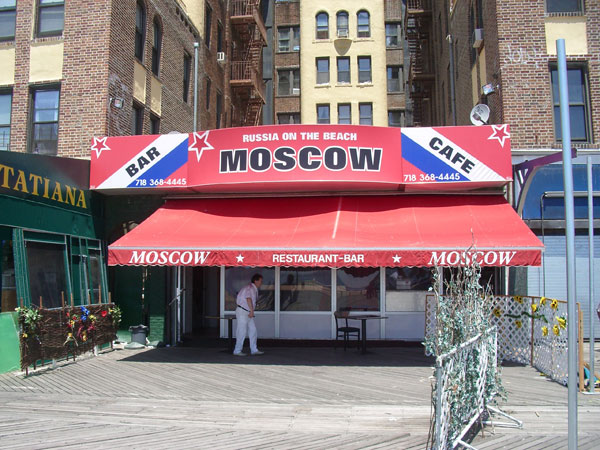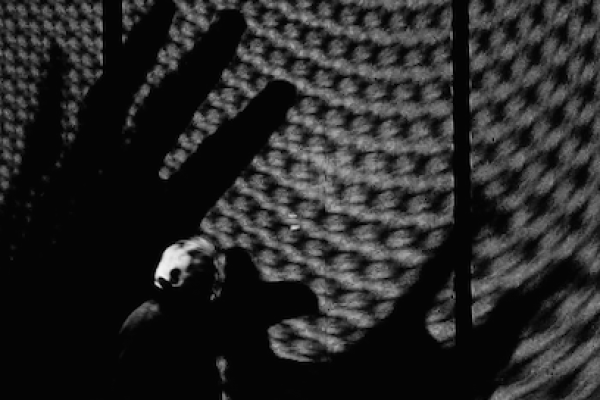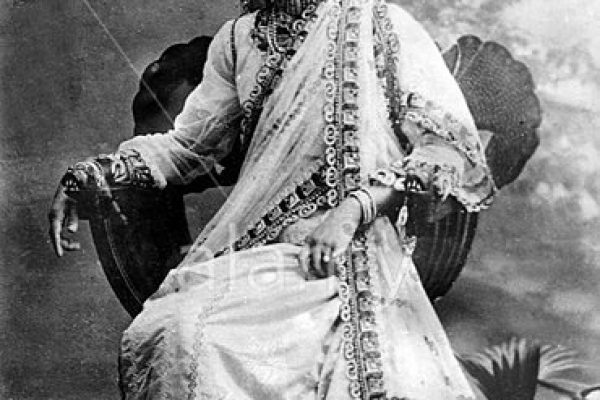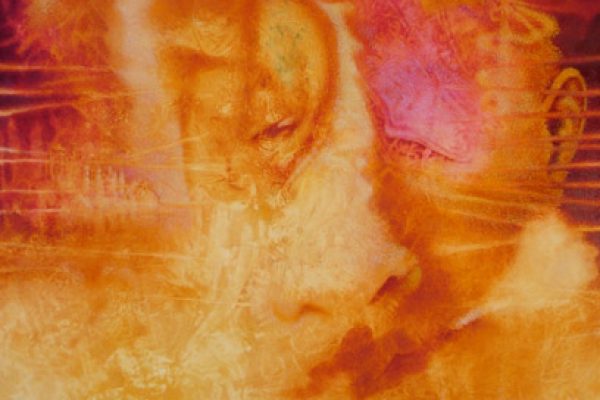Several years ago fellow critics David Stromberg, Margarita Shalina, and I were driving back to New York after giving a reading in Boston organized by Zeek, a magazine of Jewish culture and thought, which had featured us in its “Russified” issue. In the glow of the dashboard lights, a strange fact emerged: each of us had been raised in different cities by a single mother named Faina.
After years of flight from the immigrant womb world, here we were, the grown children of tenacious Fainas, examples of a suddenly visible sliver of our generation, living symbols and pawns of the last decades of the Cold War. Beginning in the late 1970s, as part of President Jimmy Carter’s pivot toward human rights and away from Nixon and Kissinger’s realpolitik of détente with the Soviet Union, roughly half a million Soviet Jews were allowed to immigrate to the United States. My family landed in Miami Beach, where we learned that the same pivot yielded 125,000 Cubans from Mariel Harbor: see Scarface (1983). Carter be damned, most Soviet Jews and Mariel Cubans became Republicans.
Immigrants don’t leave everything behind, of course. Evidently, morbid self-defeating maximalism is a “Russian” trait I have either retained or accreted since leaving Moscow as a child in 1978. The long list on page 58 represents books of literary prose published in America by “ex-Soviet” authors just since 2004. Then again, my task as a reviewer is sheer Oblomovist indolence compared to the collective literary efforts of my shock-worker compatriots, who have saved me the effort of fictionalizing my experience. Most of these writers are Jews, all of them grew up speaking Russian, and all of them began their careers in English, unlike Nabokov, who switched literary languages.
This is not an introduction but a progress report. A decade ago, in an essay in these pages called “New Jews from the Old Country,” I discussed the literary debuts of Gary Shteyngart, Lara Vapnyar, and David Bezmozgis:
The new Jewish writers have their work cut out for them. [How to] reflect the strangeness of being European immigrants when both Jewish American and American identity are already saturated with that experience? . . . The New Jews may be newcomers to the more recent ‘globalist’ model of immigrant writing. But in the broader American Jewish context, there is almost something quaint about what we represent: a throwback. After all, Jews have been American cultural insiders for almost two generations. But as Holocaust survivors die off, it seems that it falls to Russians to remind our firmly ensconced American cousins both of the theoretical tenuousness of their ensconcement (the numbingly perennial theme of the Jew as eternal pariah, even and especially when he thinks he’s an insider) and of the prevailing value of American cultural assimilation. We are their moral and cultural roller-coaster ride, where they vicariously experience the thrills of a Jewish vulnerability they know nothing about. Somebody should have told Philip Roth that there was no need for him to spin fantasies about a Lindbergh presidency and pogroms in Kentucky: the Russian Jews are here, and you can have your fill of such fantasies just by gazing intently at our sallow, young faces. We remind you to feel lucky and pleasantly afraid, and you insist we ought to feel the same way.
I speculated that “perhaps some twenty-first-century Americans might look to this new wave of immigrant fiction as they try to understand a country that can be and has been attacked, as they struggle to see through the media-saturated unreality of terror and war and through the generic spasms of grief, toward a vision of the New World that has at last become part of the Old.” Perhaps? Since then, American readers have mobbed the “Russian debutantes,” as the literary scholar Adrian Wanner calls them with a nod to Shteyngart’s 2002 groundbreaker.
Soviet émigré children spent their adolescence stretched on the rack of learning cool.
Dialectically, such mainstreaming often prompts even more vehement assertions of difference. In his memoir Little Failure (2014), Shteyngart reflects on his rather miserable years at a Jewish day school in Queens: “What happened here, this was nobody’s fault. We Soviet Jews were simply invited to the wrong party. And then we were too frightened to leave. Because we didn’t know who we were. In this book, I am trying to say who we were.” The conclusion here is that we are survivors of a lost civilization: the Soviet Union, and in most cases, more specifically, an Atlantis of Soviet Jews, quixotic lovers of Russian culture, reduced by Hitler and Stalin and finally jilted by Russian culture itself. It is striking how many books drill down to a similar essence. Slava Gelman, the hero of Boris Fishman’s A Replacement Life (2014), implies as much when a jovial German administrator, Otto Barber, uncovers his pro bono forgeries of Holocaust narratives submitted to the Conference on Jewish Material Claims Against Germany:
Barber: ‘The suffering of your grandparents belongs to you not any more than I belong to the crimes of my father. . . . I understand there cannot be justice. So all there can be, then, is the law. . . . You are a curator of suffering.’
Gelman: ‘And you are a purveyor. Which is better? You have given me too much to work with. . . . A man of means acquires them God knows how and then lectures the man without means about honor. Is it not strange to kill diligently and then commemorate diligently?’
David Bezmozgis, however, is the best exponent of this elegiac nostalgia for the nostalgia of old Soviet Jews, barnacled with war medals. In his The Free World (2011)—an uncannily meticulous historical novel about the months of purgatorial statelessness near Rome that comprised the most bizarre and pleasant stage of Jewish migration from the Soviet Union in the 1970s and ’80s—the more poignant moments depict the lost world of Samuil Krasnansky, former Party activist, partisan, veteran, apparatchik, now the impotently cranky tyrant and patriarch of a family undergoing all the new insults and delights of the West. Bezmozgis’s second novel, The Betrayers (2014), develops different incarnations of this type in the figures of Baruch Kotler, a Natan Sharansky–inspired refusenik turned disgraced Israeli politician, and Volodya (a.k.a., Chaim) Tankilevich, the mole blackmailed by the KGB to denounce Kotler forty years earlier. Bezmozgis delves deeply into the moral, historical, political, and emotional complexity of such figures, sounding the chasm between them and “young American Jews, carefree, heedless, and a little dim, cushioned from history and entrusted with too much.”
Such sounding has prompted a slightly territorial skepticism in some corners, expressed most trenchantly and amusingly by admired fiction writer and professor Mikhail Iossel, a kind of big brother to this group of writers:
I wish I were a Soviet émigré child, instead of someone who came to the U.S. at age thirty! I wish I’d been brought to the U.S., by my parents, from Leningrad or Moscow or Odessa or wherever else the case may be—at age five or seven or eleven: a little child, yes, but wise way beyond my years, already full of keen insights and inner conflict and geo-psychological torment; already, even by the age of seven or eleven, having retained enough memories and insights into the ugliness of the Soviet totalitarian system to last me the rest of my literary life, feeling suspended between two worlds, as it were, the worlds of Russia and America, America and Russia, forever, and forever wondering as to who I am, in fact, who I am more of—Russian or American, American or Russian? Dear hypothetical Soviet émigré children out there! God love you, but let me just resolve your doubts on this account: you are Americans, at least the great majority of you; American English is your native language . . . and you are Americans, which is wonderful, all irony aside, just the bees knees, and I am a U.S. citizen, but you have no more direct connection to Russia than I do to the NBA: you have connection to the Soviet-Jewish or Russian émigré community in the U.S., and it is just not the same. So it’s ok to stop wringing your figurative hands and feeling oh so blue about how torn you are with regards to your identity. Nabokov never wrote about his inner torment and being torn, about the ferocious struggle taking place within his being concerning his true identity. Neither did Brodsky . . . . Because they were grownups and knew who they were and knew, too, that talking about your inner torment (especially a somewhat artificial, manufactured one) is a little, well, unseemly . . . . There is no need to negotiate any complicated paths between the two supposedly severed halves of your lives, your past and your present. Your lifeline has never been interrupted. You are talented, ambitious people. Please be cool.
Everybody should be cool, but I am not sure how much is gained in judging the authenticity of such identity struggles. Whether they are unseemly is less interesting than whether such seemliness or unseemliness is good or bad art. Would anyone be interested in a seemlier Philip Roth? And, for my money, it is the very unseemliness of Nabokov’s arch seemliness that annoys and delights. Besides, these Soviet émigré children have spent their adolescence stretched on the rack of learning cool. In order for them to become talented, ambitious people of letters, maybe coolness has to go.
The vitality of the boom—notwithstanding my diagnosis of decadence—can be measured in its totally uncool risk taking, its assertion of what Isaac Babel once called “the right to write badly.” For example, the title and glossy cover of Irina Reyn’s What Happened to Anna K (2008) signal the risks in this lively parody of Tolstoy’s classic, abridged and reset amidst two intersecting Russian Jewish communities in contemporary New York—Ashkenazi and Bukharian. There is an often jarring—and jarringly interesting—tension between Reyn’s alternately high- and low-brow ambitions for this retelling of Anna Karenina in the age of text messaging. On the one hand, we find a telegram Tolstoy with a scholarly dash of paraphrased Saul Morson:
Guilt: What Anna K. didn’t allow herself to feel . . . . Her narrative still sprouted strands, still led to places unexpected . . . . Anna wanted to remain at the center of the story . . . [Alex, the Karenin figure,] not understanding that Anna rejected the facts before her in favor of characters and situations and myths operating more vibrantly inside her own mind. That she lived most fully not in life, but on the page.
On the other hand, we find the plumage of a paperback romance, as we learn what everybody smells and tastes like when they kiss:
Her hair smelled of charred wood, his of mint and clove cigarettes. Black currants lingering on her tongue, they exchanged purple-mouthed kisses synchronized to some Cirque de Soleil soundtrack . . . . His tongue in her mouth was hot wintergreen . . . . Was it her scent, the cinnamon of her breath?
The male equivalent of this is Shteyngart’s best-selling gross-out novel Absurdistan (2006). (Shteyngart said in an interview that the book jacket was designed so that hipster dudes on the L train would want to be seen reading it.) Ten years ago, I reviewed Shteyngart’s The Russian Debutante’s Handbook (2002) as a verbal description of Harpo Marx’s physical comedy. Absurdistan is like a verbal description of a Farrelly Brothers movie or Borat. But visual schtick worked in such films not only because they were films, but also because they actually broke standing taboos. Absurdistan, by contrast, desperately seeks taboos to break and, like a methadone addict, does not find the real thing. Shteyngart seems to know this, because he introduces two shabby hack alter egos in the novel (Vladimir Girshkin, reprised from Debutante, and Jerry Shteynfarb) to acknowledge how little he is trying to write well. Nearly every paragraph of this novel-cum-sitcom has a fat joke, by the narrator Misha Vainberg, about himself. Shteyngart is a wonderful satirist, and the moments of pure satire in the novel, such as the hero’s grant proposal for an “Institute for Caspian Holocaust Studies, aka the Museum of Sevo-Jewish Friendship,” are first rate. But the problem with satirical novels is that I want to become invested in something besides the satire, such as characters or plot or aesthetic pleasure or form. And this novel is a collection of pointless and repetitive plot twists, flat and repetitive characters, and stale and repetitive verbal gags generally involving the Russian vulgarity khui.
In his two most recent books, however, Shteyngart permits himself to write well, perhaps because he has realized that he need not be as Dostoevsky’s Fyodor Karamazov describes himself to Elder Zosima: “When I walk into a room . . . I’m lower than anyone else, and . . . everyone takes me for a buffoon, so ‘Why not, indeed, play the buffoon, I’m not afraid of your opinions, because you’re all, to a man, lower than me!’ That’s why I’m a buffoon, I’m a buffoon out of shame, great elder, out of shame. I act up just because I’m insecure.” Or, as Shteyngart confesses in Little Failure, “On so many occasions in my novels I have approached a certain truth only to turn away from it, only to point my finger and laugh at it and then scurry back to safety. In this book, I promised myself I would not point the finger. My laughter would be intermittent. There would be no safety.” He keeps this promise not only in the memoir but in Super Sad True Love Story (2010) as well. This third novel—a dystopian love story set in a near-future New York precariously shimmering on a web of Chinese credit, life-extending pseudoscience, live-streaming devices, a privatized military-industrial complex, and an Occupy-style underclass—retains some of the tics of the satirical schlemiel, but also offers funny and empathetic leaps into the souls of others, in particular that of the narrator’s beloved, Eunice Park. Again, Shteyngart knows what he’s done. When Lenny, the protagonist, ends up publishing his diaries and Eunice’s messages at the end of the novel, he notes, “Stateside critics have unanimously agreed, the gems in the text are Eunice Park’s GlobalTeens entries. They ‘present a welcome relief from Lenny’s relentless navel-gazing,’ to quote Jeffrey Schott-Liu in whorefuckrevu.”
The fact that so many of these books are meta-texts about writing and publishing is not just a reflection of the insularity of most contemporary fiction and literary scholarship. Of course, it is true that the constellation of American creative writing workshops glimmers in many of these books and in most (all?) of their authors’ lives. Culturally and structurally, MFA workshops have proven themselves incubators of excellent short story collections in the vein of Anton Chekhov, Raymond Carver, and Alice Munro, the holy trinity. To call that a problem, as some have, is like quibbling with the studio art of the Dutch or Italian masters or with the wines of the Loire Valley. Must we dismiss “yet another” painting of the Virgin? Must we clamor for wines made from gooseberries in the Bronx?
Vapnyar’s Broccoli and Other Tales of Food and Love (2008), Sana Krasikov’s One More Year (2009), Ellen Litman’s The Last Chicken in America (2007), and newcomer Kseniya Melnik’sSnow in May (2014) contain reliably good and, occasionally, exhilaratingly shocking short fictions. How else to describe the Humbertian page that concludes Melnik’s “Rumba,” set in her native Magadan, in which the reader experiences the release of its protagonist, a middle-aged ballroom dance coach who throws himself on his adolescent protégé, having carried his desire inside himself “like water in a sieve”? Other stories in these collections—replete with green card marriages and violent husbands—have the effect of Tina Fey’s devastating and corrective SNL sketch parody about Blerta, a new Albanian refugee roommate on Lena Dunham’s Girls: “I have roof over head. For this I thank God . . . . You will never do better than this man. He strong like ox and you are weak and soft and dress like baby.”
For good or ill, a short story debut typically creates pressure to follow up with a novel, rather than more stories. Ellen Litman’s follow-up, Mannequin Girl (2014), is a classic boarding school novel—with the twist that it takes place in an elite Moscow school for scoliotics during the transition to glasnost and perestroika. “Only the grave can straighten the hunchback,” goes the grim Russian proverb, but, apparently, the Soviet state saw fit to reform its slouches. Kat Knopman, the heroine, is promised that she will be transformed into a “mannequin girl,” but ultimately realizes “it won’t happen.”
Because being exceptional is nothing but a trap. It makes you obsessed with your own significance, and also, it riddles you with doubt. You do harsh things when you believe yourself one of a kind. You push away those who love you and sneer at those you deem not good enough. . . . Pedestrian is what she needs right now . . . . She has no more wish to stand out, to be either a mannequin girl or a freak. She wants to be normal, unnoticeable, average.
It is an interesting and slightly paradoxical coda for a bildungsroman—an echo of Babel’s Lyutov in “Argamak,” the last story in Red Cavalry, when he realizes that the Cossacks no longer notice him when he rides.
Vapnyar’s novels likewise tread this tension between the meta-literary desire for visibility and invisibility. She builds her first novel, Memoirs of a Muse (2006), along a parallel structure: a naturalistic historical novella narrated from the point of view of Appolinaria Suslova, Dostoevsky’s lover (and muse?), paired with a first-person novel about Tanya, a Russian Jewish immigrant who shacks up with and fancies herself a muse for a bad, middle-aged, American Jewish midlist author, a character so unsympathetically mediocre that it becomes impossible to care about him or anyone who would involve herself with him. Dostoevsky fits uneasily into this mix as little more than a pathetic old man who wanted to fuck Suslova.
Vapnyar’s second novel, The Scent of Pine (2014), also employs a parallel structure, framing Lena’s story about her summer as a Soviet camp counselor inside a New England romance. As always Vapnyar is an acute observer of interpersonal and emotional shadings across cultural and generational shifts, but the twist that brings the story and its frame together at the end of the novel feels a little too neat for fiction (though not for real life). It is striking how both of these novels, along with Anya Ulinich’s Lena Finkle’s Magic Barrel (2014), pair a Russian track about the quest for a unique artistic identity with an American one about the desire to find one’s place beside another in the New World.
It is no surprise that many of these books are saturated with an almost quixotic faith in the power of private and public self-realization through literature. After all, these authors and most of their heroes were immigrants brought up in homes with the complete works of Pushkin and Gogol, stacks of kulturnost that dwarfed the East German furniture in their shipping containers. Accordingly, Stromberg’s An American Design is a roman á clef inspired by such upstart magazines as n+1. Although its hero Maksim Bergov—a middle-aged, plagiarizing hack journalist with bad English—seems an unlikely new literary darling in this work of Bush-era social realism, he and the other characters are compelling, and one quickly comes to care about them. Fishman’s Slava Gelman likewise works for Century, a thinly veiled New Yorker magazine, concocting jokes out of fake provincial news clippings. And Finkle is a novelist like her creator Ulinich.
Ulinich’s first novel, Petropolis (2007), featured Sasha Goldberg, a Russian-Jewish-black, single-mother immigrant heroine more absurdly improbable than even Shteyngart’s obese Vainberg. The difference is that Ulinich’s narrator seems to care about Goldberg and her quest to find her father in America and care enough about the other characters in the novel that the reader comes to care, too, and comes to want to see the world through her eyes and experience. This is because Ulinich understands the need for what Dostoevsky called “wit that comes from great feeling”—that the human tragedy-comedy calls for artistic amelioration, that a novel lends formal and emotional coherence to the random dismemberments of real life. The result is a funny, entertaining, sad, and humane work. Her more autobiographical graphic novel debut, Lena Finkle’s Magic Barrel, doubles down on these qualities, as it embraces the raw confessional style of Art Spiegelman and Alison Bechdel—and of Roth, who is given a cameo only to tell Finkle that she is “nothing like” him, that she is a “perverse hybrid of Alexander Portnoy and his mother!” This perverse combination is what makes this bildungsromance a perfect response to Roth’s.
Keith Gessen, unlike Ulinich, set out to write what feels like a social realist novel that would speak for the over-educated American men who came of age in the late 1990s. The critical response to his book, All the Sad Young Literary Men (2008), perhaps understandably, was split along generational lines: most critics over the age of fifty (such as Joyce Carol Oates) praised the work, while his intended readership—all the sad, young literary men he told me he wanted to “help”—hated being summed up. They harped on the narcissism of two of the protagonists—Keith and Mark, virtually indistinguishable authorial alter-egos—when their narcissism was precisely the point of the novel: elite colleges breed narcissists fit only for disappointment in love, politics, and profession.
I warned Gessen that I could not omit his novel as an example of the new Russian Jewish American boom, even though this is not how he thinks of it, nor how it was marketed. Yet Gessen draws on the Russian intellectual and literary tradition in a way broadly similar to that of every other author reviewed here. The title of Ulinich’s Petropolis is taken from the Osip Mandelstam poem that figures prominently in the plot and emotional nervous system of Ulinich’s novel: “Transparent star, a wandering fire, / Your brother, Petropolis, is dying.” The poem is an elegy for a lost home and a lost civilization—indeed for all lost civilizations. A lament for “a past that has not been born yet,” to quote Mandelstam, permeates virtually every period of modern Russian culture. Likewise, the heroes of Gessen’s novel—two of three of them assimilated Russian Jewish immigrants with doleful countenances—carry elegiac Russian baggage: Isaac Babel in the Lubyanka Prison, barred from finishing his work; the hapless but eloquent and endearing Mensheviks; the small émigré presses (Ardis, YMCA-Presse); arguments about Lenin and Stalin that no longer make sense. Lost yet formally intact worlds that, in contrast, underscore the uncommitted, diffuse, fragmented America of the turn of the last century—a diffusion that after 2001 has revealed itself more clearly as vulnerability than as strength.
This sentiment is not unique to new writing by ex-Russians, but Russian history and culture become powerful literary resources, a potent shorthand, for expressing it. It is what Wanner calls a “venerable cliché” about Russian spiritual depth and American shallowness, discernible in most of these books. It is a cliché that continues to find resonance in the New World as it becomes, well, Old. And maybe that’s not the end of the world.








